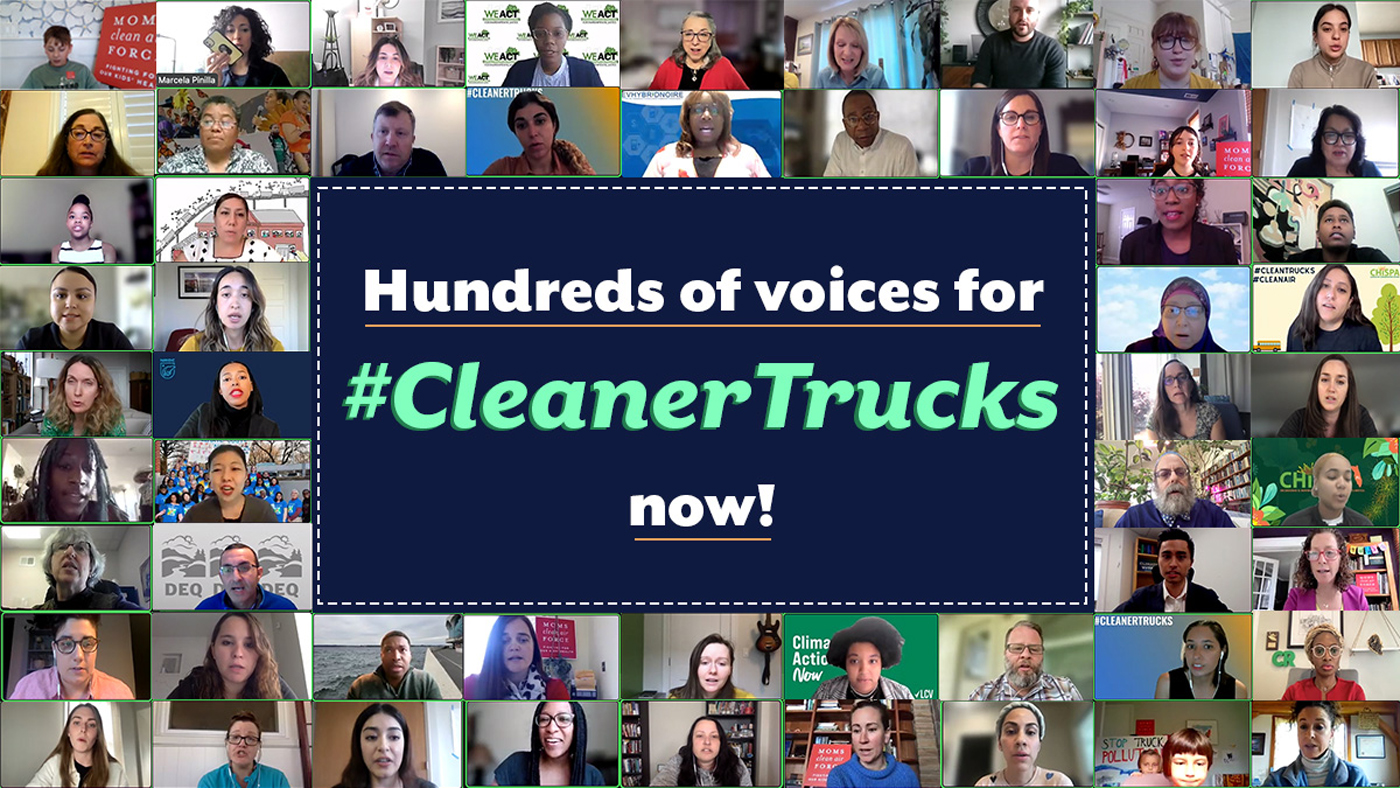The deadline for public comments is rapidly approaching for an Environmental Protection Agency proposal for curbing pollution from heavy duty trucks, a significant source of dangerous air pollution nationwide which disproportionately impacts communities of color. In the past few months, the agency has heard from thousands of people, many of them Sierra Club advocates, calling for cleaner trucks via submitted comments and public hearing testimony.
EPA’s Clean Trucks proposal contains a standard that would reduce nitrogen oxide pollution from on-road heavy duty trucks, as well as a standard that would reduce greenhouse gas emissions from transit buses, school buses, last mile delivery trucks, and day tractors. Though trucks and buses make up only 10 percent of all vehicles on the road in the US, they spew 45 percent of the transportation sector’s nitrogen oxide pollution, 57 percent of its fine particulate matter pollution, and 28 percent of climate-disrupting emissions. This air pollution is linked to a host of health problems, including childhood asthma, chronic illnesses, lung cancer, and premature death.
Because I currently live in Washington, DC, and fortunately live near convenient public transportation and my son’s daycare, I don’t own a car. However, that means when we’re on the go, my two year old breathes in toxic emissions. Every day while I'm walking or bike riding with my toddler, I am frustrated with the health-threatening diesel fumes spewing from trucks and buses driving through our neighborhood. While my son is in awe of the huge yellow school buses, garbage trucks, concrete mixer trucks, and big rigs that drive past our cargo e-bike – I desperately want those vehicles to be zero emissions to reduce the exposure of diesel pollution on his young lungs and the lungs of his peers across the country.
I’m not the only one worried about the health effects of truck pollution. The Sierra Club helped prepare many members of the public to testify before the EPA about this standard. At last month’s EPA public hearing on this standard, many voiced their concerns in their testimony.
“I am testifying on the fact that over 190,000 Ohio children have been diagnosed with asthma,” said Peggy Ann, a registered nurse with the Alliance of Nurses for Healthy Environments. “A disproportionate percentage of Black and poor children are affected by asthma with Black children visiting the emergency room at a rate four times greater than that of white children. As the Ohio Department of Health points out, ‘Asthma is the most common chronic disease in children, imposing a consistent burden on Ohio’s healthcare system and a significant impact on overall health, quality of life, and healthcare costs.’”
Claire Morgan expressed concerns for children’s health as well. “I urge you to move quickly to strengthen this rule for Heavy-Duty Engine and Vehicle Standards,” testified Morgan, a Sierra Club member in Oregon. “‘Diesel Free’ must begin now so your grandchildren and mine can take a deep breath of cool, clean air and see deep blue skies as they grow.”
The Sierra Club was also part of a coalition of groups that sent a letter to the Truck & Engine Manufacturers Association urging its members to stop lobbying against stronger federal and state regulations on truck pollution and to establish a 2035 zero-emission truck target for its member organizations.
From the letter:
“EMA and [its] members must recognize this moment of opportunity, seize the technological solutions that are available, and take a bold leadership role in the transition to zero-emission trucks and buses, which do not release tailpipe pollution. We’re strongly urging EMA to join us in pushing for stronger clean truck rules that will rapidly maximize the public health benefits for the communities that need them most.”
The Sierra Club hosted a virtual panel of experts who discussed the massive opportunity and responsibility the EPA has this year to strengthen this standard. The panel members spoke of the significance of this issue for public health, environmental justice, and climate action and urged the EPA to listen to advocates and make the rule stronger to slash diesel pollution in frontline communities and tackle the climate crisis.
We have a crucial opportunity right now to require manufacturers to deliver cleaner heavy-duty vehicles. We have a responsibility to ensure that every school bus that picks up our children, van that passes through our neighborhood, and truck that crosses busy corridors is zero emission.
As I told the EPA during my testimony, “Please be bold and develop these truck rules in line with Biden’s environmental justice and climate commitments. Toddlers, parents, truck and bus drivers, and residents in D.C. and across the country all deserve clean air. We need the strongest possible bus and truck standards to protect everything and everyone we hold dear.”
